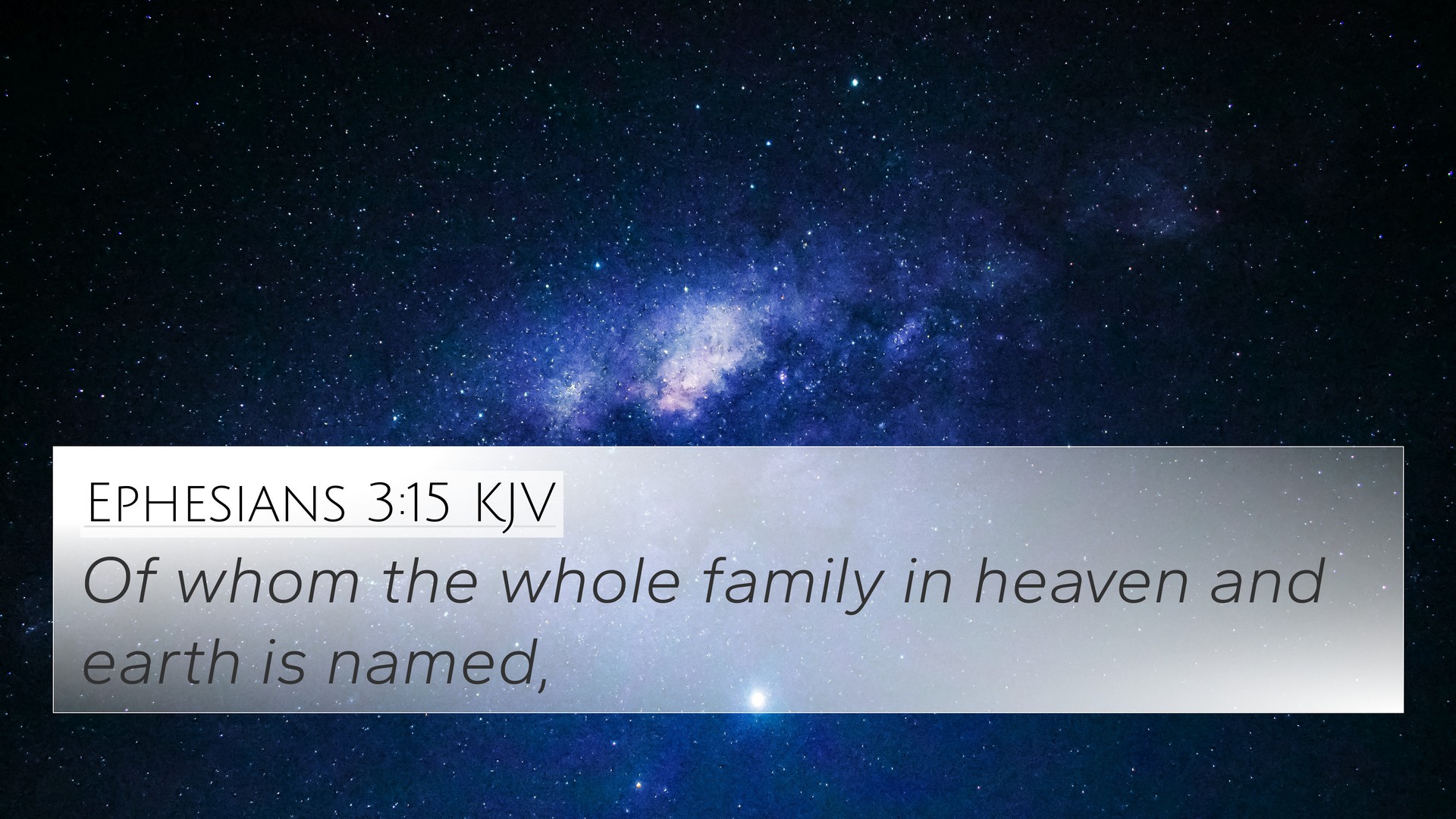Ephesians 3:15 - Understanding the Verse
Ephesians 3:15 states: "From whom the whole family in heaven and earth is named." This verse, situated within one of Paul’s letters, illuminates the theological significance of God's family and the universal nature of God's sovereignty.
Interpretation Overview
According to the commentaries of Matthew Henry, Albert Barnes, and Adam Clarke, this passage emphasizes the unity and identity of believers as children of God. It draws attention to both the heavenly and earthly dimensions of God's family, suggesting that all creation acknowledges God as the divine Father.
Key Insights from Commentaries
- Matthew Henry:
Henry explains that “the whole family” reflects the vastness of God's creation. All believers, whether from heaven (angels) or earth (humans), find their identity in God. This naming signifies belonging and kinship, illustrating that believers are part of a larger spiritual family.
- Albert Barnes:
Barnes highlights the significance of the term "named," indicating that God's family transcends geographical and temporal bounds. This verse asserts that all who are created and redeemed are under one Father, reinforcing the bond of unity among all believers regardless of their origins.
- Adam Clarke:
Clarke emphasizes the familial aspect of God’s relationship with humanity. He notes that the term “family” conveys the idea of a household under the authority of a paterfamilias, stressing the role of God as the overseer and sustainer of His children in both realms.
Cross-References and Thematic Connections
This verse connects significantly with several other scripture passages. Here are some key cross-references:
- Galatians 3:26: "For you are all children of God by faith in Christ Jesus." This verse reinforces the idea of believers being children in God's family.
- John 1:12: "But as many as received Him, to them He gave the right to become children of God, to those who believe in His name." This emphasizes the theme of adoption into God's family.
- 1 John 5:1: "Whoever believes that Jesus is the Christ is born of God." This introduces the theme of spiritual rebirth and belonging to God's family.
- Colossians 1:16: "For by Him all things were created that are in heaven and that are on earth." This passage emphasizes God’s sovereignty over all creation, establishing the foundation for being named in His family.
- Romans 8:15: "For you did not receive the spirit of bondage again to fear, but you received the Spirit of adoption by whom we cry out, 'Abba, Father.'" This connects with the theme of intimacy and personal relationship with God.
- Hebrews 12:22-23: "But you have come to Mount Zion and to the city of the living God, the heavenly Jerusalem... to the general assembly and church of the firstborn who are registered in heaven." This reinforces the concept of a universal church that encompasses all believers.
- Philippians 3:20: "For our citizenship is in heaven, from which we also eagerly wait for the Savior." This emphasizes the believer's identity in both heaven and earth.
Thematic Bible Verse Connections
The themes in Ephesians 3:15 resonate throughout the Bible, illustrating the intricate connections that exist in scripture. Understanding these connections not only deepens biblical literacy but also enhances personal faith journeys:
- Unity in Christ: The secularity of believers into one body (1 Corinthians 12:12).
- God’s Sovereignty: Acknowledging God as the creator and sustainer (Acts 17:28).
- Believers' Identity: Exploring the themes of creation and redemption in relation to God's family (2 Corinthians 5:17).
Practical Applications and Cross-Referencing Tools
For those looking to explore deeper into biblical texts and their connections, utilizing bible concordances and bible cross-reference guides become essential tools. Here are some methods and resources to assist in this journey:
- How to Find Cross-References in the Bible: Start with a concordance to locate words and themes.
- Bible Cross-Reference Guide: Use thematic systems to see how verses correlate by subjects.
- Cross-Referencing Bible Study Methods: Develop comprehensive studies around specific themes, ensuring all passages are considered.
- Comparative Study of Pauline Epistles: Analyze the unity of mission and doctrine across Paul's letters.
- Bible Cross-References for Sermon Preparation: Collect supportive scriptures that underpin central themes in a message.
Conclusion
Ephesians 3:15 encapsulates the rich identity of believers as part of God's family, inviting further exploration and understanding of related scriptures. Utilizing cross-references not only enhances the understanding of this verse but also enriches the experience of engaging with the Bible as a cohesive work of divine revelation.
For anyone interested in delving deeper into bible verse cross-references, the practice of cross-referencing Biblical texts, and appreciating thematic Bible verse connections is both rewarding and spiritually enriching.













